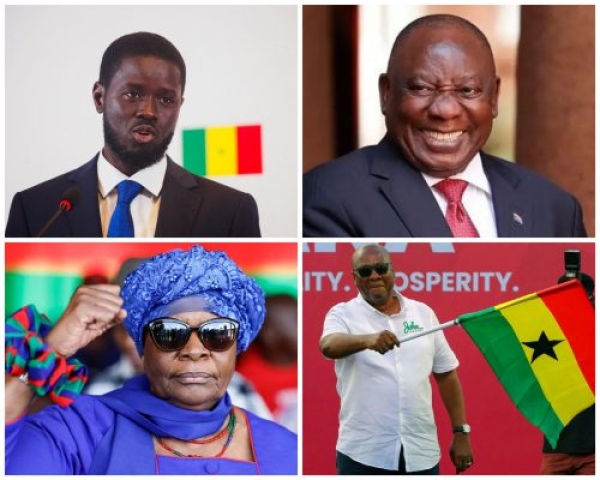Africa witnessed a transformative year in 2024, with elections in Senegal, South Africa, Botswana, Namibia, and Ghana dominating headlines.
These polls, marked by significant outcomes and circumstances, reshaped the political narratives of their nations and underscored the evolving democratic maturity across the continent.
Senegal
Senegal’s presidential election, held on March 24, 2024, was a critical juncture for the nation’s democratic trajectory. The election culminated in the victory of opposition candidate, Bassirou Diomaye Faye, who was released from prison barely two weeks before the poll.

The 44-year-old former tax officer emerged as the youngest democratically elected president in West Africa.
South Africa
On May 29, 2024, South Africa conducted its general elections, marking a historic shift in its political arena.
The African National Congress (ANC), which had maintained an absolute majority since the end of apartheid in 1994, experienced a significant decline, securing just over 40% of the vote—a substantial drop from nearly 70% during its peak.

This outcome necessitated the formation of coalition governments, which cemented Cyril Ramaphosa’s second term, introducing new dynamics into South Africa’s governance structure.
Botswana
Botswana’s general elections in October 2024 signified a potential end to the Botswana Democratic Party’s (BDP) 58-year dominance.
Duma Boko, the candidate of the Umbrella for Democratic Change (UDC), defeated President Mokgweetsi Masisi, who immediately conceded defeat and congratulated the winner.
Namibia
Namibia’s elections on November 27, 2024, were historic, resulting in the election of Netumbo Nandi-Ndaitwah as the country’s first female president.

She secured 57% of the vote, extending the ruling South West Africa People’s Organisation (SWAPO) party’s 34-year hold on power since independence from apartheid South Africa in 1990, despite a reduction in parliamentary seats from 63 to 51.
Nandi-Ndaitwah emerged as vice president in February after President Hage Geingob died while in office.
This election underscored the electorate’s demand for economic reforms and gender representation in leadership.
Ghana
Ghana’s December 7, 2024, elections tested the resilience of its democracy. The opposition leader and former President John Mahama secured victory, with the incumbent Vice-President Mahamudu Bawumia conceding defeat.

This election has once again cemented Ghana’s reputation as a beacon of democracy in Africa. The election was widely lauded for its transparency and efficiency by local and international observers.
The 2024 electoral outcomes in these African nations underscore a continental shift toward demanding greater accountability, transparency, and inclusivity from political leaders.
The willingness of electorates to unseat long-standing parties indicates a maturation of democratic processes and a commitment to addressing socio-economic challenges through responsive governance.
These elections also highlight the increasing role of women in leadership positions, as evidenced by Namibia’s election of its first female president.
The 2024 elections in Senegal, South Africa, Botswana, Namibia, and Ghana were pivotal in redefining political landscapes, promoting democratic resilience, and reflecting the evolving aspirations of African electorates.
[Business Day]


